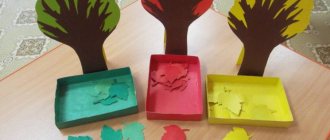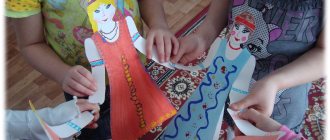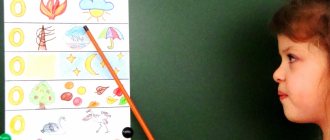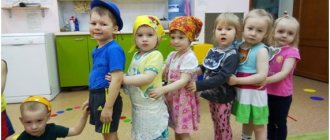Planning for speech development for older preschoolers
Olga Rusina
Planning for speech development for older preschoolers
Goal: To form coherent speech in children of senior preschool age .
Tasks:
Educational:
• identification and development of children’s speech abilities
• teach mastery of the basic elements of correct, precise speech;
• develop initial skills to analyze and evaluate communication and speech.
Developmental:
• development of children's speech through a system of special productive exercises;
• development of all components of children’s oral speech (lexical side, grammatical structure of speech, pronunciation side of speech; coherent speech - dialogical and monologue forms;
• development of free communication with adults and children;
• development of pronunciation and improvisational skills of a preschooler ;
• development of the concept of appropriateness of using non-verbal (non-verbal)
means of communication - gestures, facial expressions, body movements, intonation;
• development of a preschooler’s oral speech : voice color, volume, tempo, etc.;
• developing the ability to interact with a communication partner; analyze your speech behavior ;
• development of the child’s communicative qualities.
Educational:
• instilling in children the need to observe speech etiquette , kindness and a positive worldview;
September
3 week
"Hello, autumn"
Recognize the main signs of autumn in nature.
4 week
"Visiting Autumn"
Use your imagination and memory to create images on the topic: be able to show images expressively with the help of pantomime and speech.
October
1 Week
"Gifts of Autumn"
Develop logical thinking , speech, develop the ability to listen carefully to a riddle: do not interrupt your comrades.
2 week
"Journey into the Forest"
Develop imagination ; expressiveness of speech; Develop an interest in nature.
Develop voluntary attention; speech; visual-figurative thinking; cultivate respect and interest in the work of a gardener
3 week
“Trees and shrubs ” of our city Conversation: What shrubs and trees we know ”
To introduce children to the wide variety of vegetation in our native region.
4 week
"Day of colorful leaves"
To consolidate children's knowledge about the autumn variety of flowers. Develop empathy (sympathy; compassion)
imagination; cultivate a caring attitude towards living nature. at the leaves
November
1 Week
"Riddles in the garden"
Continue to teach children to answer questions accurately and completely, and to construct sentences of 4-6 words. Develop skills in writing a story based on personal experience. Reinforce general concepts (vegetables, harvest, exercise the ability to form adjectives from nouns.
2 week
Retelling of K. V. Lukashevich’s story “Winter”
Strengthen a coherent, consistent retelling, expressively convey the content, reproduce dialogues. Practice selecting antonyms, memorize phrases with the sound [z, z'].
3 week
Retelling of the story by E. Permyak “How Misha wanted to outsmart his mother”
Encourage a coherent, sequential retelling, correctly convey the idea and content, expressively reproduce dialogues.
4 week
"Granny is a mystery"
.
Strengthen children's ability to solve riddles; develop communication skills;
Learn to combine speech with movement; develop imagination .
— Practice intonation of dialogues.
— Develop the ability to use expressive means of voice.
— Teach sketches with imaginary objects and actions.
December
1 Week
"Favorite Tales"
Continue to strengthen children’s ability to tell a fairy tale with the help of a teacher; develop communication skills;
— Practice speech breathing , practice exhalation.
— Learn to combine speech with plastic movements; encourage participation in theatrical play.
— Teach children to pronounce words with intonation and expressiveness.
— Teach children to guess
2 week
Creative storytelling “Writing poems about winter”
Develop interest in the poetic genre, develop auditory attention , enrich vocabulary, practice inventing short poems on the topic of winter.
3 week
"New Year's riddles and proverbs"
Continue to form an idea of the genre features of riddles and proverbs, learn to distinguish them from other works of small folklore forms. Learn to comprehend riddles and proverbs. Expand your vocabulary on the topic New Year. Improve your ability to regulate your voice strength
and tempo and speech
4 week
Conversation “New Year and Christmas”
Continue to introduce children to the history of New Year and Christmas celebrations. Expand your vocabulary on the topic. Learn to answer a question in a complete sentence. Practice the formation of cognate words. Intensify the use of synonyms and antonyms in speech.
January
2 week
Coming up with a fairy tale on the theme “Winter Magic”
Develop the ability to invent a fairy tale on a given topic
Exercise in the selection of synonyms, antonyms, definitions. Comparison of feminine, masculine, neuter adjectives. Practice word formation
3 week
Storytelling based on the picture “Winter fun”
To promote the ability to come up with a beginning and an end to the plot depicted in the picture. Intensify the use of words on the topic of winter in speech. Learn to distinguish by ear and differentiate sounds in pronunciation
4 week
"Make up a story"
To develop the ability to understand the figurative meaning of words and expressions that, depending on phrases, change their meaning, and transfer them into a coherent statement
February
1 Week
"Answer quickly"
Encourage to engage in playful and verbal interaction with peers, consolidate the ability to classify objects (by color, shape, quality)
; teach them to think and respond quickly.
2 week
"Our Defenders"
Teach children to verbally fantasize based on a musical composition.
— Develop a sense of rhythm , the dynamics of a musical image and understand the mood in a melody.
— Practice clear diction through tongue twisters.
— Teach children to interact with each other in the pronunciation of dialogues.
— Develop attention , memory, observation, imaginative thinking in children.
— Practice acting out imaginary situations
3 week
Creative storytelling “Why”
Strengthen the ability to compose interrogative sentences, independently use question words: “why?”
,
"from what?"
,
"When?"
,
"What?"
,
"Where?"
. Introduce word formation methods
March
1 Week
"Spring came"
.
Continue to introduce children to small folklore forms.
— Teach children to pronounce a given phrase with a certain intonation in combination with gestures; develop communication skills.
— Learn to combine melodious speech with plastic movements.
— Develop children's imagination . — — Encourage an emotional response to the game, to enter into the proposed circumstances.
2 weeks
“Pinocchio came to visit us”
speech attention , articulatory apparatus.
Encourage you to enter into dialogue with adults and peers, lead to the compilation of a brief description of the toy, and freely operate with words in a “live”
sentence models, name details of objects;
intensify the use of verbs; establish forms of polite address; develop
3week
"Who is faster?"
Encourage children to engage in playful and verbal interaction with peers; clarify and expand children’s knowledge about sports: winter and summer; develop quick response to signals and resourcefulness; expand children's vocabulary
4 week
“Who will notice more fables”
Encourage to enter into dialogue with adults and peers, teach to notice fables, illogical situations, and explain them; develop the ability to distinguish the real from the imagined; develop verbal and logical thinking.
April
"Say it differently"
Encourage children to engage in playful and verbal interaction with peers, teach children to choose a synonym - a word that is close in meaning; develop verbal and logical thinking.
2 weeks
. "Let's play with our fingers"
Introduction to the finger theater. Mastering the skills of mastering this type of theatrical activity.
— Develop fine motor skills in combination with speech.
— Formation of a sense of musical tempo.
— Development of a sense of rhythm and coordination of movements.
- Development of strong oral exhalation.
3week
"Good words"
Encourage active perception of the poem. Understand the semantic content.
— Learn to perform a musical composition, conveying the image of kindness and friendship.
— Develop communication skills.
4 week
"Funny essays"
.
Exercise children in selecting rhymes for words.
Reinforce the concept of “rhyme”.
Encourage collaborative poetry writing.
— Improve the intonation of speech; develop the ability to use expressive means of speech.
— Encourage children to write simple stories with children as their heroes.
— Develop children's imagination ; encourage imagination.
May
1 Week
“Visiting S. Ya. Marshak”
Give an intonation-figurative idea of the poem;
— Encourage figurative embodiment in the role.
— Develop voice power.
— Learn to move expressively, participate in the dramatization of works.
2 week
"Funny riddles about pets"
Give an idea of the genre features of riddles. Learn to distinguish them from other works of small folklore forms. Expand your vocabulary on the topic “Pet”
.







